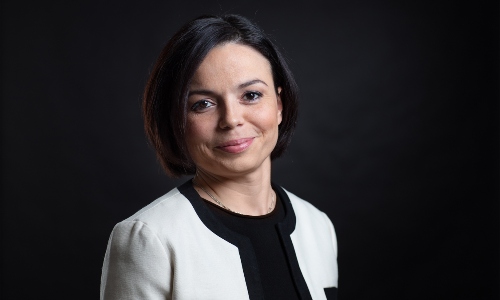Amid DWS’ greenwashing scandal, 14 women in charge of an ESG equity fund are standing their «investment» ground and sticking to their principles at Germany's embroiled asset manager.
«In hindsight, it was probably the worst possible timing to launch a fund,» co-founder of DWS Invest ESG Women for Women, Denise Kissner (image below), said reflecting on how the investment climate deteriorated after the new ESG equity fund with a focus on social aspects went live in January this year.
An additional blow came from greenwashing accusations against the fund manager in June. All but the ideal backdrop to be selling an ESG fund, one could argue.
Then again, seeing as the social aspect of ESG investing has come sharply into focus this year, others might say the timing was spot on. The controversy around DWS certainly proves that only those who genuinely believe in following an ESG path into the future are prepared to apply the necessary meticulousness to get us there.
To be sure, Kissner's team shows no signs of backing down.
Insufficient Data
When Kissner, previously a product specialist for DWS' successful 28-billion euro «Top Dividende» strategy, was first approached by management in 2011 to start a fund run by and for women, the time wasn’t right nor was there enough data.

Denise Kissner, co-founder of DWS Invest ESG Women for Women (DWS)
At the time 50 percent of checking accounts were held by women in Germany, yet only 25 percent had their own securities account, illustrating the opportunity to get more women into investing. But there were other factors that still needed to be aligned.
«We looked into it, but companies didn’t disclose enough information about their social engagement and society wasn’t ready for the fund either,» Kissner said.
Improved Uptake
Besides having to address the right topics to get women interested in investing, there is also the problem that «when it comes to investing women have more to lose,» she said. This is because women, while half of the world's population, possess only one-third of its wealth and are poorer from the outset.
DWS Invest ESG Women for Women fund has closed the gap among its investors and female and male participation is equal, she said.
Commitment Score
The fund, run by 14 women comprising 12 portfolio managers and two product specialists, invests globally in 110 companies including emerging markets, and has a volume of around 50 million euros.
Based on DWS’ own Social Commitment Score, the team selects companies that perform well in terms of working conditions along the entire value chain and analyzes them in relation to equal rights and opportunities within the company's workforce and gender distribution at the management level.
Champagne Yes but No Cognac
Due to considerations around domestic violence, the fund will not invest in companies that produce hard liquor, although companies selling wine and beer are permitted. Other hard exclusions include controversial weapons, tobacco, nuclear, and coal power. Companies with high climate transition risks and those violating UN norms are also banned.
Most companies fall into the mid-range with only 15 companies globally qualifying for the top segment, which astounds Kissner as she considers these to be «reachable targets.»
Long-Term
The team is interested in how companies will evolve over time. «It’s no use if there are three women sitting on a company's board, but there are no women in middle management,» Kissner said. Companies will often seek advice as to what they can do to improve in terms of social factors which, for Kissner underscores the long-term benefit of engaging with companies.
Social aspects are likely to have a positive effect on the productivity and profits of companies, which often leads to good performance on the stock market in the long term, she said.
The sector in question also plays a huge role when it comes to analyzing social aspects. When the fund is looking at investing in a healthcare company, for example, it will look at how study cohorts are put together.
Speaking Up
«We want to know if the sample groups of clinical studies include women» and are not solely male-based, Kissner said, adding «it is important to know what effect certain medicines have on the female organism.»
Without being able to explain why this is the case, Kissner has observed that women are more comfortable asking companies questions related to social topics.
She does know, however, that if the private sector doesn’t do anything to address issues around inequality, it will take society a lot longer to resolve them.































